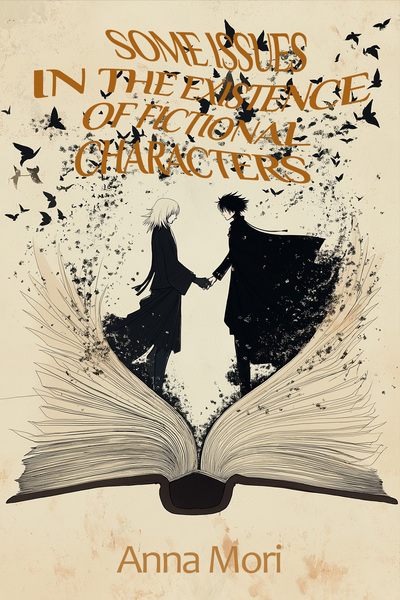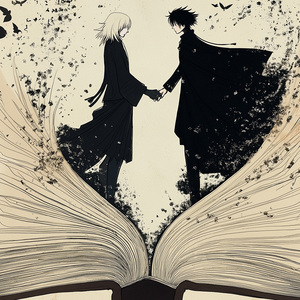For in all fairy tales, stories, and fantasy films, whenever boys found themselves in magical lands, whenever they battled monsters, they always emerged victorious. That means there must be such a law of fairy tales, and that law is on my side. So what is there to fear?
— Vladislav Krapivin, Children of the Blue Flamingo
Born of the union between an elf and a human, Svartulf the Cruel was an outcast to both peoples. He grew up a cunning deceiver, filled with scorn for everything but himself. Raised among elven sages, he shared in the power and wisdom of all elves, gaining magical might equal to that of the wisest scholars and the greatest kings. But he twisted the knowledge bestowed upon him and turned it to darkness, for he fell prey to envy and craved eternal life — a gift that, since the world’s creation, had belonged to elves alone.
Through deception and treachery, he seized Alvstein, the ancient treasure that had housed the light of the Sun, Moon, and Stars since the dawn of time. The stone’s master would be granted immortality, and it was foretold that the fate of the Two Kingdoms was bound to it. When Alvstein was stolen, a time of sorrow fell upon the elves, for from that moment, they too became mortal.
Yet the wise creators of Alvstein had decreed that unclean hands could not touch the sacred stone, and so their curse befell Svartulf. Though the stone granted him immortality, he could not bear to be near it, for its radiance caused him unbearable agony. Thus, he was forced to imprison the stone within a vault, forever separated from the very source of his power.
But his wicked strength only grew. Over the years, Svartulf’s power grew so immense that he came to rule over most of the lands of elves and men, reigning with a grip of terror that darkened the hearts of all living beings. And as time passed, even his form became monstrous, twisted and grotesque, a reflection of his deceitful, blackened soul.
Yet the most abhorrent of Svartulf’s deeds was the rift he drove between elves and humans. The humans blamed the elves for his existence, while the elves held mankind responsible. Children born of mixed blood came to be seen as cursed, and such offspring were slain at birth. The union of elf and human was declared an abomination, forbidden under the strictest law. All things tied to the realm of men became objects of fear and revulsion among the elves. And the cruelest insult one could hurl at another was: "Your mother was an elf."
Then came a time so dark that no words in the tongues of elves or men could capture its horror, and it seemed that hope had abandoned the world.
But after the blackest hour, the dawn always follows — and in that time of despair, two warriors arose, their hearts burning with valor.
One was called Shougo Silver-Tongue. The other was El, son of Lowlite.
None among elves was nobler or kinder than Prince El. He had no love for the clamor of battle; his heart belonged to the music of the forest and the quiet joy of deep contemplation. Yet his father, the king, grew old, and the prince — youngest of seven brothers — was determined to prove himself the worthiest heir to the throne of the Elven Realm. He dreamed of restoring his people’s lost power, of reclaiming the immortality that had once been theirs.
Shougo, on the other hand, was no noble warrior — he was a rogue from the lands of men, a cunning outlaw who had committed countless crimes. Sentenced to death, he demanded a chance to challenge Svartulf, the immortal fiend. If he fell, it would be in a battle of legend; if he triumphed, he would return not as a condemned man, but as a hero granted pardon. He had little faith that the rulers of men would agree — but so desperate were the times that even the faintest glimmer of hope was enough for people to grasp.
And so, side by side, Prince El and Shougo Silver-Tongue set forth into the heart of darkness. And as they journeyed together, the elf prince — pure of soul — came to regard the outlaw as a friend, despite the long-standing enmity between their peoples...
"God, it worked!" — Makishima wanted to exclaim. But instead, his lips, suddenly acting of their own accord, uttered:
"Where have we found ourselves, my prince?"
"You would know better than I, my friend. The only certainty is that we are on our way to certain death."
If looks could kill, L would have done it right then and there. Makisima had a suspicion that the grandiloquent language of heroic epics had significantly softened the actual emotional charge of those words. (Not that L didn’t have every right to be furious. If he decided to punch Makisima in the face for this whole page stunt, Makisima wouldn’t even protest too much.)
They stood at the edge of a forest, holding the reins of two horses. Before them stretched miles of marshland, its surface broken here and there by gnarled black trees, their twisted branches like the fingers of an ancient crone. On the horizon, a massive black tower loomed against the sky. In short, their destination could have served as the ultimate gold standard of bleak and menacing landscapes — Edgar Allan Poe himself, had he been here, would have torn his hair out in envy and admitted his utter creative impotence.
Makisima glanced at his companion. L hadn’t changed much in appearance, though his features had grown finer, and the unruly mess of his hair now deserved to be called "an artistically disheveled mane." He was dressed in something white and vaguely medieval, falling in elegant folds, embroidered with silver and fastened with a fibula set with a precious stone. A narrow silver circlet rested on his forehead, and his ears had taken on an elven point.
Makisima wanted to comment that the whole scene looked like something out of a bad movie, but instead, his lips betrayed him once more:
"This land has tempered you, turning a boy into a most noble man."
L’s eyebrows climbed skyward. Makisima, deciding he might as well lean into the madness, added:
"I am honored to be your vassal, my prince, no matter what trials fate may bestow upon us."
No matter what he tried to say, only flowery nonsense came out. This genre was determined to make a fool of him. I swear, I'm embarrassed. Just hit me if you want, he pleaded silently with his eyes, hoping L would understand.
L sighed, still looking at him with a mix of exasperation and reluctant patience.
"At least you did not abandon me in this battle," he said.
"Do not disgrace me so. I may be but a simple brigand, yet I have my honor."
"Ill tongues claim the gods have bestowed few virtues upon your people… I am glad to see such slander proven false, for you humans are full of nobility and kindness."
Was that… sarcasm? Looked like L had adapted to this universe’s brand of courtly double-speak at record speed.
"So what’s the plan, prince?" Makisima asked.
"I believe our path leads to that accursed tower. Somewhere within, Svartulf keeps Alvstein. It is our duty to reclaim the stolen treasure of my people."
Makisima figured L was probably right — better to follow the book’s plot. Even the most mediocre work of fiction usually had a clear moral and logical conclusion.
"Perhaps our duty is not only to reclaim Alvstein but to raise our weapons to the heavens in righteous fury and vanquish Svartulf," Makisima suggested. "After that, we should finally be able to return home."
L nodded in agreement.
Everything should go smoothly, Makisima thought. After all, in fantasy, heroes always defeat Dark Lords.
Then came the thunder of hooves, followed by the whistle of arrows slicing through the air.
A dozen riders were charging toward them. Not unexpected — no fantasy narrative, however naive, would allow a Dark Lord to leave his tower and its treasure unguarded. A heavy, barbed arrow struck Makisima’s shoulder — his left one, thankfully.
L had already produced a slender, ornately carved bow from somewhere and strung an arrow with the ease of someone who had done it a thousand times before. Makisima, meanwhile, found a sword at his hip — a beautiful weapon with an elegantly crafted guard. Where had a common brigand gotten such a thing? "Prince El lent it to me for the journey, since my old sword was unworthy," his newly implanted artificial memory supplied. The sword even had some appropriately dramatic, unpronounceable name, as was customary for such stories. Makisima barely had time to think, "I really don’t care for these Freudian metaphors," before realizing his hands somehow knew exactly how to hold it, his feet how to move, dodge, and strike. In short, he fought well.
A heady thrill washed over him — an intoxicating rush of power, just like in childhood, when he could lose himself in a fairy tale about knights and monsters.
Only when their ten foes lay in a heap of bloodied flesh did he remember — they weren’t monsters. They were men.
One had his skull split open. Another’s belly was slashed apart. Someone’s collarbone had been severed, someone else’s limbs hacked away. Shards of bone jutted from gaping wounds. The air reeked of blood.
They should be grateful the patrol had been so small, that the two of them were such capable fighters they had barely been wounded. And yet — the magic of the fairy tale had vanished in an instant.
L was staring at the bodies with an unreadable expression.
Makisima guessed this was the first time L had ever killed a person with his own hands, the first time he had seen death up close in all its grotesque reality. And, with some irritation, he thought — Must be nice for him, a lucky child of a peaceful age, never having seen the messy scraps left behind when a human being is torn apart by a Dominator.
Maybe that was why Makisima was so fond of his razor — an elegant weapon, lethal… and, in a way, merciful.
He reached for the arrow in his shoulder and nearly howled in pain.
For all the artificiality of this universe, its nauseatingly predictable plot, its theatrical scenery — pain and death were real enough.
Then again, if anything in the world was real, it was pain. The very first thing a person feels upon entering life.
"Prince, I don’t think we can keep cutting our way through hordes of enemies for much longer — we need to be cunning," Makisima said and quickly laid out his hastily devised plan.
...They dragged the bodies into the forest, hiding them from prying eyes. The clever Shougo donned the dark garments of one of the fallen foes, taking on the guise of a servant of Svartulf…
"Should I not disguise myself as well, my friend, to avoid drawing attention?" L asked.
"You will draw attention regardless. We’ll make it seem as though you’re my prisoner. Trust me, Prince."
Makisima didn’t add that he vastly preferred for all eyes in the tower to be on the captured elf rather than on himself. Besides, who in this world would ever suspect that a human and an elf could be working together?
...And so the prince and his companion dared to infiltrate the tower where Svartulf kept his treasure. Disguised, Shougo roused no suspicion among the Dark Lord’s servants who guarded that dreadful place — they took him as one of their own. El, however, was thrown into a dungeon. The servants of Svartulf did not know his name, his title, or his purpose, but they recognized at once that he belonged to the race they despised above all others.
And so they tormented him, starved him, demanded the same answers over and over. But the prince did not speak. And the days dragged on.
Shougo watched as the noblest of elves suffered in the depths of that prison, but there was nothing he could do. His heart turned to ice to keep from bleeding out…
"Please, trust me," Makisima said, day after day. "I will not let you die in this wretched cell. I will find a way."
Every time he came to the dungeon, Makisima was grateful for the dim glow of the torch, which revealed so little of the darkness. He had no desire to know just how many fresh bruises, cuts, burns, lash marks, or torn-out nails the elf prince had acquired that day. In secret, away from the eyes of the other guards, he brought him food and a salve that might dull the pain — though it wasn’t as if his heart was truly bleeding for him. He simply suspected that the elf prince was the actual protagonist of this story, and he had no idea what he’d do if, heaven forbid, the man died.
And yet, with every passing day, L looked worse — and, seemingly, trusted him less.











Comments (0)
See all